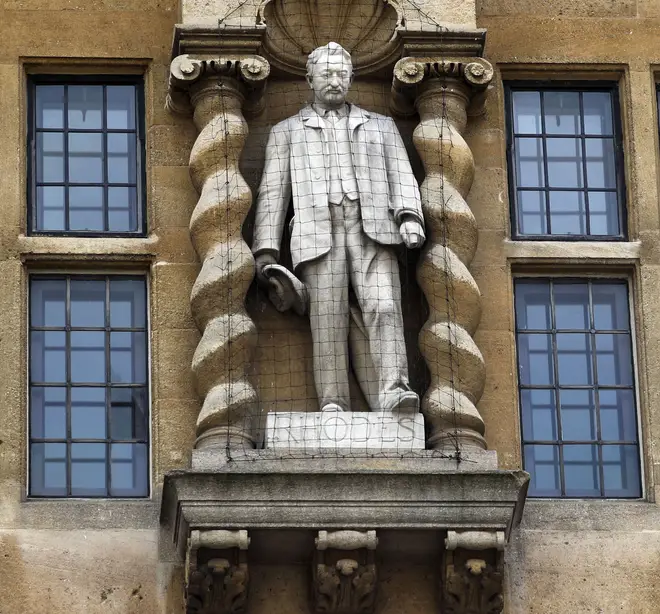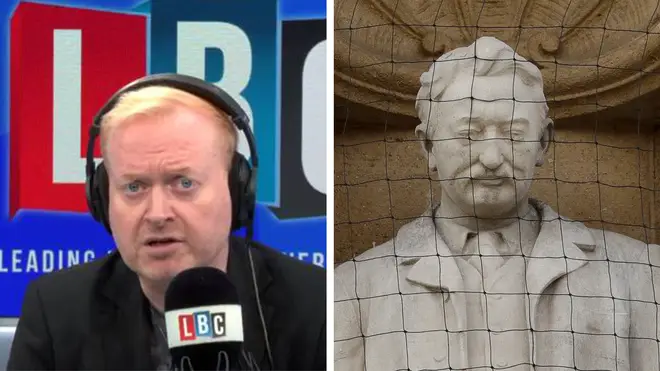
Nick Ferrari 7am - 10am
18 June 2020, 13:27 | Updated: 18 June 2020, 20:50

Oxford City Councillor tells LBC the Rhodes statue has to come down
An Oxford Councillor has warned the "world is watching" over the removal of the statue of Cecil Rhodes but has called for clarity over the timeline for when it will come down.
"The world is watching, as are the citizens of Oxford," says local Councillor about the proposed removal of the Cecil Rhodes statue.
Shaista Aziz was one of the 26 councillors in Oxford that co-signed a letter last week, calling for the removal of Rhodes' statue from Oriel College.
"It has to go", she said. "I think Oriel College has done the right thing by issuing this statement." However, she warned against people calling the move a victory yet saying there needed to be further clarity on the timeline of what would happen with the statue.
"many years of campaigning have led to this position. Students have been involved, as have activists and campaigners from our city, but what's really made the big difference is the people of Oxford, the people of this city who have come out in their thousands to demand Rhodes' falls.
"The College has to understand that it can't backtrack on this. The world is watching, as are the citizens of Oxford."

Darren asked her about what she thought led to the dwindling of the campaign between 2015 when it began and the re-emergence of the debate now.
Sighting that a lot had been going on behind the scenes in the intervening years, Shaista also added, "the difference now is that this campaign has connected with the people of Oxford."
She acknowledged that a divide existed between the people of the city, but the divide had been bridged by the revolt against the statue in recent weeks.
Darren then drew comparisons between the treatment of the Edward Colston statue in Bristol and that of Rhodes in Oxford.

He pointed out many people felt that "the statue (Colston) should not have been standing, but this is not the way to go about it.
What is really obvious here as that the people of Oxford want this statue to fall, the proper process is absolutely being gone through as well.
This answers the charge that the process in Bristol has not been proper."
However, Shaista rebuked this insinuation. "This shows that what happens in one city there was a domino effect and to be fair to the campaigners in Bristol they tried over many, many years to have the same dialogue as we have been trying to have in Oxford.
"At the heart of this not only is the legacy of the British Empire and colonialism and racism and where we are right now in terms of structural racism.
"It is about power.
"How do we hold people in power to account when they don't want to be held to account when they don't want to be transparent in their decision making?"
She believed the wider conversation was around how to hold those at the top to account and demand change. She also wanted to make clear that Oriel College had not been forthcoming with this change and was still "dragging it's heals".
Moving on to how the UK discusses it's history Darren asked Shaista about the hidden dark side of the UK's past.
"People say we have to own the bad parts of our history as well as the good parts and we're blanking out what we've done by simply getting rid of these statues."

Shaista responded: "The blanking out of history is not by the removal of statues, it is by the removal of British history from our curriculums in our schools."
She spoke from her own personal experience of having questions about the UK's awkward history and being rebuked by teachers.
"I am the great-granddaughter of colonised subjects, so I know about that history from my family, but at no point did I learn about in school in this country.
"The need to move racial justice forward does not mean we are removing history, it means we are really bringing history to life and the context to life", Shaista concluded.

Cecil Rhodes statue protest outside Oriel College in Oxford
This comes in response to the governing body of Oriel College in Oxford, recommending that the statue of Cecil Rhodes be removed from the college grounds. The decision came following renewed pressure and protests outside the college, part of a movement that originally started back in 2015 with the 'Rhodes Must Fall' movement by students at Oxford.
Carole Souter, the current master of St Cross College and former chief executive of the National Lottery Heritage Fund, will chair an independent commission to determine the fate of the statue.